|
|
|
Sort Order |
|
|
|
Items / Page
|
|
|
|
|
|
|
| Srl | Item |
| 1 |
ID:
115400
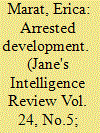

|
|
|
| 2 |
ID:
144749
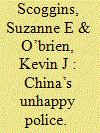

|
|
|
|
|
| Summary/Abstract |
Facing heavy caseloads, administrative drudgery, and low pay, China’s street-level police are frustrated. Front-line officers from six cities report that discontent encourages shirking, corruption, and waste. Grievances and feelings of powerlessness have not been reduced by recent reforms, and give us cause to rethink the image of police as effective arms of a highly securitized state.
|
|
|
|
|
|
|
|
|
|
|
|
|
|
|
|
| 3 |
ID:
075021
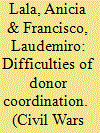

|
|
|
|
|
| Publication |
2006.
|
| Summary/Abstract |
This article is explores UNDP's SSR activities in Mozambique, from the last stages of the post-civil war DDR programme until the beginning of 2005. It focuses primarily on the police force while looking at similar efforts in the judicial sector. It also focuses on how UNDP's strategic planning capacity and programme approaches affected the outcome of reforms sought. Finally, it analyses the constraints of Mozambique's SSR that affected its progress and implementation, including the rationale for embarking on reform and the persistent resistance to change by national institutions.
|
|
|
|
|
|
|
|
|
|
|
|
|
|
|
|
| 4 |
ID:
143790


|
|
|
|
|
| Summary/Abstract |
This article explores why local police officers choose to comply or to resist the police reforms stipulated by an international peacebuilding mission operating in their country. In order to understand the role and impact of local agency and shine light on local actors’ compliance decisions, this article analyses two examples of police reform of the EU Rule of Law Mission in Kosovo. This article makes three contributions to the peacebuilding and compliance literatures. First, it formulates and tests causal mechanisms showing exactly how local actors’ motivations for compliance – legitimacy, coercion and reward-seeking – are causally linked to compliance. Second, it shows that legitimacy, coercion, and reward-seeking do not influence compliance directly, but only through the hypothesised intervening variables. Finally demonstrates that while legitimacy matters to local compliance choices, it does so only in specific contexts and situations.
|
|
|
|
|
|
|
|
|
|
|
|
|
|
|
|
| 5 |
ID:
131103
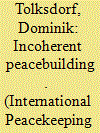

|
|
|
|
|
| Publication |
2014.
|
| Summary/Abstract |
Between 2002 and 2008, the European Union simultaneously applied interventionism and the promotion of local ownership as policy approaches in its peacebuilding efforts in Bosnia and Herzegovina. This article introduces an analytical framework to evaluate the coherence of the EU's policies and applies this framework to two case studies involving the police sector: the EU's support to the fight against organized crime and to negotiations on a police reform. The article concludes that the two policy approaches applied by the EU were incoherent and that this incoherence contributed to the failure to achieve police restructuring in Bosnia.
|
|
|
|
|
|
|
|
|
|
|
|
|
|
|
|
| 6 |
ID:
117120
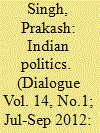

|
|
|
| 7 |
ID:
166167
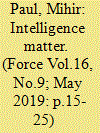

|
|
|
| 8 |
ID:
185078


|
|
|
|
|
| Summary/Abstract |
The US and UN are two of the largest patrons of police reform programs worldwide: between 2000 and 2020, the US provided approximately $160 billion in police assistance to more than 130 countries worldwide; simultaneously, the UN spent over $77 billion supplying police-oriented security sector reform to countries experiencing or having experienced armed conflict, doing so through the deployment of peacekeeping missions and within the offices of UN Police, the UN’s hub for police reform and training programs. Though these two providers seek the same overall objective, they often vary in their specific goals: the US often engages in foreign police reform to promote its own national security objectives by increasing institutional capacity, while the UN adopts police reform programs to promote institutional constraint. The two models have important implications for how we understand bilateral and multilateral reform programs, including activities performed and recipient countries targeted across both time and space. Using originally collected data on US security assistance programs as well as a careful analysis of original data on UN mandates, this article provides the first quantitative exploration of these two different modes of assistance, comparing and contrasting their objectives and where, when, and how they are provided.
|
|
|
|
|
|
|
|
|
|
|
|
|
|
|
|
| 9 |
ID:
080527
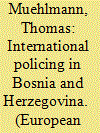

|
|
|
|
|
| Publication |
2007.
|
| Summary/Abstract |
Police Reform in Bosnia went through different phases. Particularly when starting to address the organisational reform of police forces, new structures and institutions were introduced. This, however, was undermined by the behaviour of leading police officers and particularly the political elite fearing for their influence over the police. The essay argues that in such reforms, in particular at later stages of a reform process, when the organisational setup and the culture of policing is addressed, they tend to be hampered by a lagging behind of mindsets compared to the establishment of new structures/institutions, in particular also in the political elite - a factor that needs to be taken into consideration and that leads to the conclusion that police reform needs a long breath to be continued engagement to become irreversible and sustainable.
|
|
|
|
|
|
|
|
|
|
|
|
|
|
|
|
| 10 |
ID:
113284
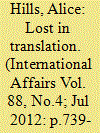

|
|
|
|
|
| Publication |
2012.
|
| Summary/Abstract |
The transfer of democratic values and practices such as community-based policing to African police forces is a key aspect of western aid and security policies, yet the cultural transmission on which it depends is not fully understood; the ways in which African officers respond to theories and practices imported from western societies has yet to be assessed critically. Further, despite decades of international support for police reform and re-education, there is little evidence to support the assumption that the skills, technologies and procedures associated with western policing can act as an effective channel for the transmission of democratic values. This article uses the Nigerian police's response to both externally funded and internally generated reform projects to address a question with implications for policy transfer more generally: what explains the uneven transmission of politically sensitive forms of knowledge? It discusses how imported ideas and practices are received by Nigerian officers and political elites, and how they are transformed having been filtered through local interests and dispositions. It shows that even when the process of reform is accepted, the political will required to ensure its effective implementation is not. Democratic practices do not travel well because recipients respond to imported practices in an adaptive manner, integrating aspects of donor understanding and indigenous realities.
|
|
|
|
|
|
|
|
|
|
|
|
|
|
|
|
| 11 |
ID:
179785


|
|
|
|
|
| Publication |
New Delhi, Pentagon Press, 2021.
|
| Description |
xvi, 196p.hbk
|
| Standard Number |
9789390095414
|
|
|
|
|
|
|
|
|
|
|
|
Copies: C:1/I:0,R:0,Q:0
Circulation
| Accession# | Call# | Current Location | Status | Policy | Location |
| 060033 | 320.54/PAC 060033 | Main | On Shelf | General | |
|
|
|
|
| 12 |
ID:
127067
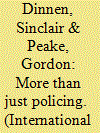

|
|
|
|
|
| Publication |
2013.
|
| Summary/Abstract |
Against the generally disappointing outcomes of international police reform in fragile settings, this article examines a New Zealand-supported community policing programme in post-conflict Bougainville. While the programme's engagement with the regular police organization has struggled for traction, support provided to an innovative and socially embedded policing initiative has produced promising results. The reasons behind these divergent outcomes and their implications for international policing are explored in the context of Bougainville's recent history, including the legacies of conflict and the new vision of hybrid policing in the post-conflict political settlement.
|
|
|
|
|
|
|
|
|
|
|
|
|
|
|
|
| 13 |
ID:
067137
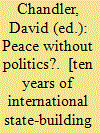

|
|
|
|
|
| Publication |
London, Routledge, 2006.
|
| Description |
xi, 176p.hbk
|
| Series |
CASS series on peacekeeping
|
| Standard Number |
0415348226
|
|
|
|
|
|
|
|
|
|
|
|
Copies: C:1/I:0,R:0,Q:0
Circulation
| Accession# | Call# | Current Location | Status | Policy | Location |
| 050473 | 949.74203/CHA 050473 | Main | On Shelf | General | |
|
|
|
|
| 14 |
ID:
075022
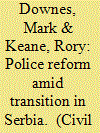

|
|
|
|
|
| Publication |
2006.
|
| Summary/Abstract |
Overcoming the legacy of the past is never easy. Add in a brewing ethnic conflict in the south, and the task of supporting the institutional transition from a politicised and autocratic police force into a viable and democratic police service and you begin to understand the daunting task facing the Serbian government and its partner, the Organization for Security and Cooperation in Europe (OSCE) in the months following the overthrow of the Milosevic regime in October 2000.
The OSCE's role as an independent broker was essential in negotiating a path between a demoralised and outdated police force and a sceptical, untrusting public. Now some six years since the start of the police reform process, it is safe to say that the police service in Serbia today is distinctly different from the one that was inherited from the Milosevic government. Much, however, remains to be done for it to be a truly modern, representative and democratic service. This paper provides an 'inside' take on the OSCE's engagement with the Serbian police reform process, its institutional strengths and limitations. Through the lens of the years 2000-2004, this paper will critique the ability of the OSCE to support police and security reform processes. As such the article will assess how the OSCE and the Serbian authorities responded to the challenges facing the policing sector in the post-Milosevic Serbia.
|
|
|
|
|
|
|
|
|
|
|
|
|
|
|
|
| 15 |
ID:
075631
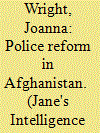

|
|
|
| 16 |
ID:
146929
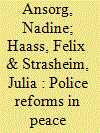

|
|
|
|
|
| Summary/Abstract |
This article presents new data on provisions for police reform in peace agreements (PRPA) between 1975 and 2011. The PRPA dataset complements past research on the determinants and effects of specific terms in agreements with detailed data on police reform provisions. The PRPA dataset also adds a quantitative dimension to the thus far largely qualitative literature on post-conflict security sector reform (SSR). It includes information on six subtypes of police reform: capacity, training, human rights standards, accountability, force composition and international training and monitoring. We show that there is currently a high global demand for the regulation of police reform through peace agreements: police reform provisions are now more regularly included in agreements than settlement terms that call for power-sharing or elections. We observe interesting variations in the inclusion of police reform provisions in relation to past human rights violations, regime type, or the scope of international peacekeeping prior to negotiations, and illustrate the implications of police reform provisions for the duration of post-conflict peace. Finally, we stimulate ideas on how scholars and policymakers can use the PRPA dataset in future to study new questions on post-conflict police reform.
|
|
|
|
|
|
|
|
|
|
|
|
|
|
|
|
| 17 |
ID:
077183
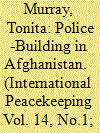

|
|
|
|
|
| Publication |
2007.
|
| Summary/Abstract |
Despite considerable effort and large sums of money spent over five years of police reform in Afghanistan, the investment has yet to yield significant results. Among the reasons outlined in this article are the failure to distinguish clearly between the different roles of the police and the military in contributing to security sector reform; a lack of strategic vision and effective planning; and a failure to capitalize on the insights, best practices and lessons learned from the last 30 years of police reform in the West. Finally, recommendations are made for remedying current problems and re-directing reform to achieve greater effectiveness
|
|
|
|
|
|
|
|
|
|
|
|
|
|
|
|
| 18 |
ID:
175825


|
|
|
|
|
| Summary/Abstract |
Development practitioners and scholars have touted security sector reform (SSR) in Sierra Leone as a model for intervention. Twenty years after such reforms began, the West African country presents one with the opportunity to study the medium-term impact of SSR. This article argues that specialists should consider this SSR along five dimensions: security institution building, military reform and integration, internal security reform, professionalization, and disarmament, demobilization, and reintegration. This study further explores the impact these factors have had on security performance and legitimacy in the two decades since their implementation. Finally, this work concludes with an analysis of the current state of the security sector as well as a consideration of the lessons to be learned from the Sierra Leonean experience.
|
|
|
|
|
|
|
|
|
|
|
|
|
|
|
|
| 19 |
ID:
164012
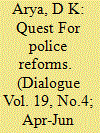

|
|
|
| 20 |
ID:
161122
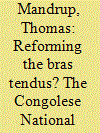

|
|
|
|
|
| Summary/Abstract |
The security sector reform (SSR) programme in the Democratic Republic of the Congo (DRC) has failed, according to a former high-level member of the United Nations (UN) mission in the DRC, as a large section of the country remains outside government control, and the security institutions of the state continue to constitute one of the predominant sources of insecurity for the local population in a number of ways. Based on several field studies, this article critically scrutinises the SSR of the Congolese National Police (Police nationale congolaise; PNC) and the efforts to reform it between 2004 and 2016. It further attempts to explain why so little progress was made in the SSR of the PNC, despite extensive involvement from donors. The article shows that the instrumental and traditional approach to SSR is partly to blame, because in this case it failed to address the root problems and initiate the needed fundamental reform and reconstruction of the police force. It also shows that reforming local security institutions becomes even more difficult when the local authorities do not support the effort.
|
|
|
|
|
|
|
|
|
|
|
|
|
|
|
|
|
|
|
|
|